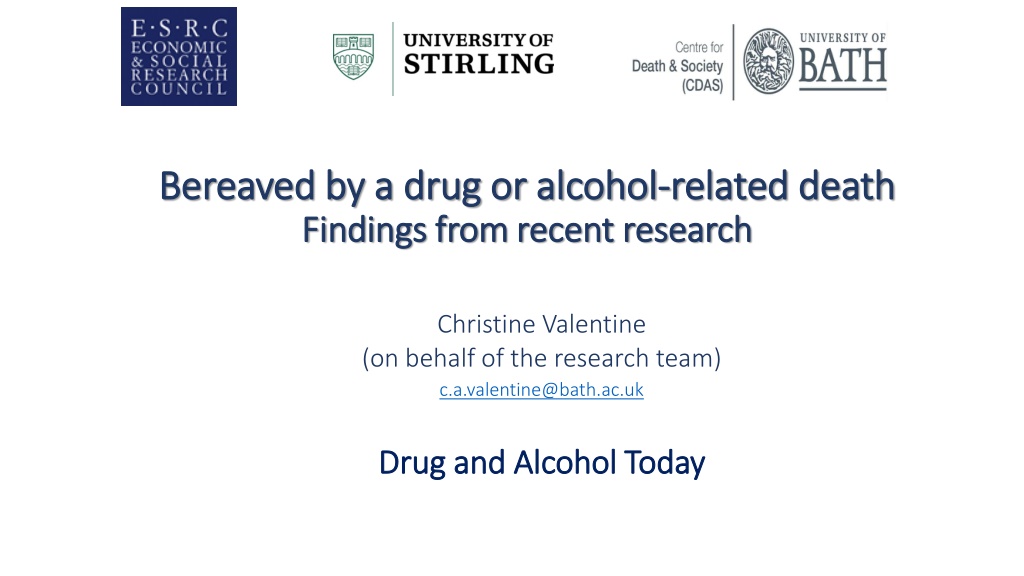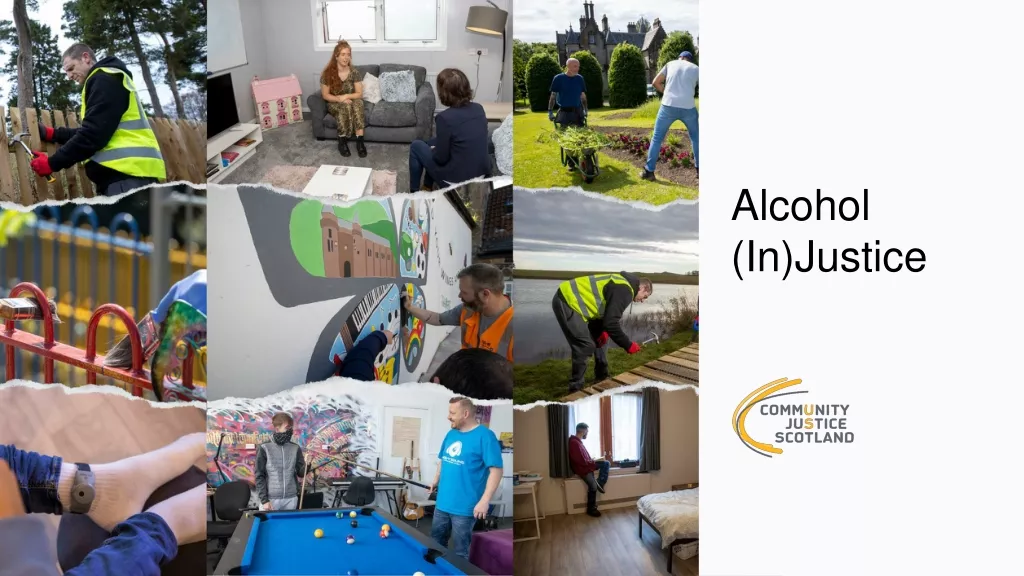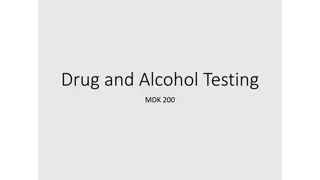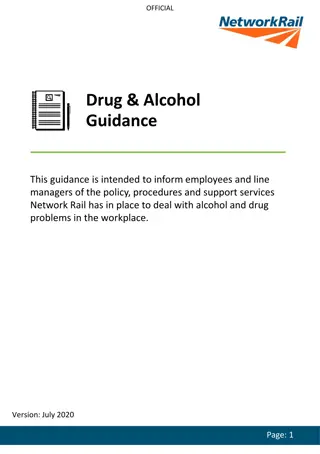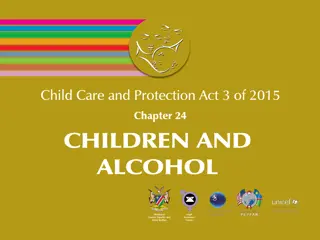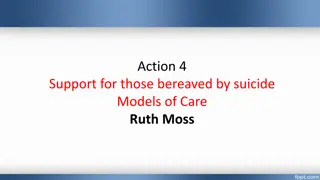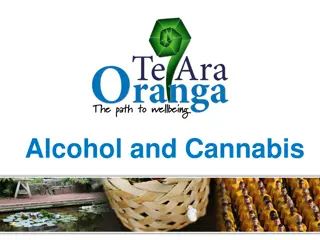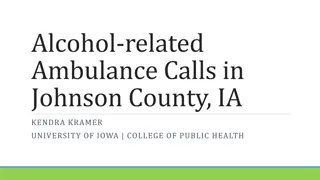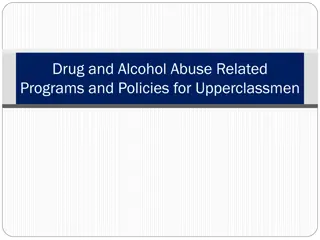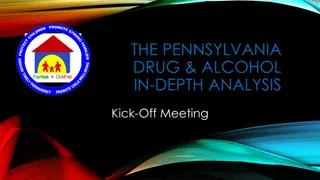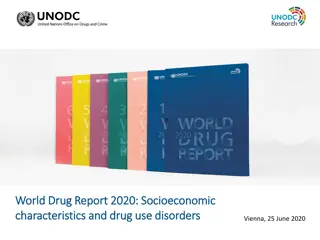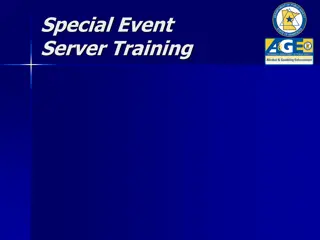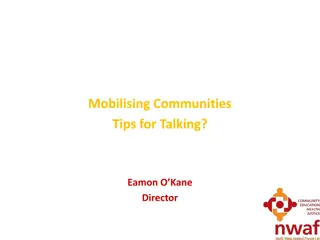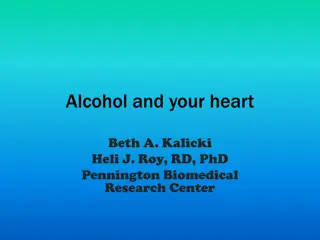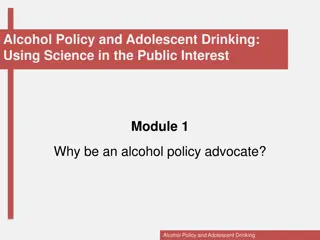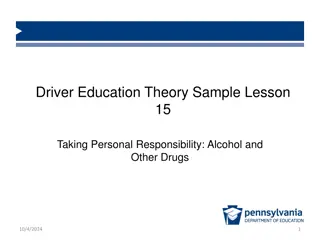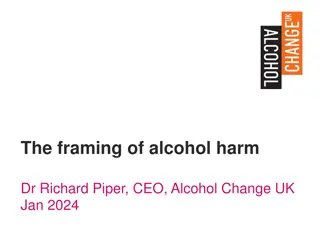Bereaved by a Drug or Alcohol-Related Death: Recent Research Findings
This research project, funded by ESRC, aimed to understand the experiences and needs of individuals affected by the death of a loved one due to drug or alcohol-related causes. The study included interviews with bereaved family members and practitioners, focusing on improving service responses to this group. Findings revealed insights into grief and challenges faced by those impacted by substance use deaths, informing the development of practice guidelines.
Download Presentation

Please find below an Image/Link to download the presentation.
The content on the website is provided AS IS for your information and personal use only. It may not be sold, licensed, or shared on other websites without obtaining consent from the author. Download presentation by click this link. If you encounter any issues during the download, it is possible that the publisher has removed the file from their server.
E N D
Presentation Transcript
Bereaved by a drug or alcohol Bereaved by a drug or alcohol- -related death Findings from recent research Findings from recent research related death Christine Valentine (on behalf of the research team) c.a.valentine@bath.ac.uk Drug and Alcohol Today Drug and Alcohol Today
Overview of the project Overview of the project Funded by ESRC(2012-2015) to find out about the experiences and needs of bereaved family members and individuals following a drug or alcohol-related death of a loved one. Study location : SW England (University of Bath) and Scotland (University of Stirling). Research team of 9, including 1 Bereaved family member; and Advisory Group of 6 practitioners (one also bereaved). Twofold aim to 1: Understand Understand the experiences and needs of those affected by the death of a loved one through substance-use. 2: Improve the way services respond Improve the way services respond to this group of bereaved people.
The Research Team The Research Team Christine Valentine, Lorna Templeton, Tony Walter (University of Bath). Linda Bauld, Jennifer McKell/Allison Ford(University of Stirling). Joan Hollywood, Gordon Hay, Richard Velleman (Consultants) http://www.bath.ac.uk/cdas/research/understanding http://www.bath.ac.uk/cdas/research/understanding- -those those- -bereaved bereaved- -through through- - substance substance- -misuse/ misuse/
What did we do? What did we do? A Two Phase Study A Two Phase Study Phase 1 o Interviews Interviews with 106 bereaved family members in England and Scotland largest known qualitative research sample of its kind. o Findings to inform Phase 2. Phase 2 o Focus Groups Focus Groups with 40 practitioners a range of services (some also bereaved), including members of police, coroner services, PHE, funeral services, clergy, media, substance use and bereavement services. o Working group Working group of 10 practitioners and bereaved people tasked with developing a set of practice guidelines.
The interview sample The interviewees The interviewees Female 79, Male 27 (ages 22-75). 12 in treatment; 9 in recovery. The deaths The deaths M 79, F 23 (ages 16-84). Mainly alcohol and/or opiates, incl alcohol-related illness, overdose, suicide, murder. Time since death Time since death ave 8 yrs (1 month to 30+ yrs) Relationship to deceased Relationship to deceased 56 parents (incl some couples interviewed together) 21 children 13 spouses/partners (incl ex s & 1 LGBT) 13 siblings (incl step-sibs) 6 friends, 3 nieces Interviewees and deceased were mainly white British Interviewees and deceased were mainly white British
Phase 1: What did we learn those we interviewed? Phase 1: What did we learn those we interviewed? Grief may be compounded by issues relating to 4 main areas: 1. 1. Life: Life: impact of person s substance use while alive. 2. 2. Death: Death: the circumstances, including treatment by services. 3. 3. Memory: Memory: remembering (formally and informally), a life that may be considered unfulfilled. 4. 4. Stigma (actual and perceived): Stigma (actual and perceived): stigma of substance use transfers to bereaved family members as being dysfunctional or even complicit - their grief being devalued/unrecognised. Note: Stigma also pervades other 3 areas.
1. The life/living with anothers substance use 1. The life/living with another s substance use The relationship with the person before they died will affect how those left behind grieve that person s death. If substance use was involved then grief will be compounded by the following: Living with the possibility of death: death expected and sense of already having lost the person to their addiction. With alcohol this situation may be long-standing and accompanied by other serious health problems. Being unaware of substance use: death unexpected, e.g. accidental overdose. Not knowing how to respond to substance use and feeling that whatever course of action they took ultimately failed. Demands of person s substance use may threaten family relationships as well as those beyond the family - sense of isolation.
Living with the possibility of death Living with the possibility of death A living bereavement The day I found out he was on drugs was the day that part of me died. And the day I realised that he would probably not make it....the progressive illness of addiction had really taken hold. There was really no hope any more, he was definitely dying and it would just be a matter of time (Mother talking about son) she was in the high dependency unit and I thought she was going to die and she didn t.....I felt like that was the point at which I really lost her....I went through a grieving process then which I think is probably more akin to what people would usually experience when they lose somebody (Daughter talking about mother)
Threat to family and beyond Threat to family and beyond Threat to family relationships Threat to family relationships and gradually I felt sort of driven to almost a choice, you know, the drinking is causing great upset in the whole family. Who do I look after? Do I sort of expend loads and loads of time and effort trying to rescue him from this situation or do I think about the other members of the family..? (father talking about son) Threat to relationships beyond the family Threat to relationships beyond the family I d been up a lot of the night because Mum had been drunk and I was very tired and I got to school the next day and I can remember thinking I just can t hold this all in and a teacher coming in and saying well so and so is going to be off school for a while because her Mum s got cancer and me thinking oh god I really wish my Mum had cancer because then I could talk about it say to people I can t cope, I haven t slept, do you know I had to cook all the meals at the weekend and I couldn t because I was completely embarrassed (daughter talking about mother)
2. 2.Circumstances/treatment Circumstances/treatment by services by services Cultural images of dying well include dying at home, with close others, peacefully, with dignity etc. Substance-related deaths often far removed from this ideal(though in some cases partially achieved) as follows: More often the person died alone or away from home, in presence of professionals, without privacy, dignity or peace. Responses from professionals often (though not always)insensitive and unhelpful. Negotiating official procedures could be daunting and time- consuming, due to complex and disparate system, which could involve a criminal investigation.
A difficult death A difficult death Dying alone Dying alone the neighbours alerted that nobody had seen her for a few days, because she lived at the front of a set of flats, and so police broke in and found her, so that I still feel really bad that she just died on her own, and she wouldn t have understood, she would have thought everyone had abandoned her because she never got that she actually drove everyone away. But it was horrible and you could see when you went in the flat where she must have fallen. (daughter talking about mother) A far from peaceful death A far from peaceful death So we agreed to having the machine turned off. And he died I think it was a day later... But it was awful, because when they switch the machine off, if you can picture a fish out of water, that s what we were looking at. We had to watch him gasping and writhing for a day he didn t slip away peacefully. (Mother talking about son)
3. The Memory 3. The Memory Cherishing fond memories has been found to help bereaved people find continuity and meaning in the death but what about remembering a life and death involving substance use? A mixed picture: Some struggled with difficult memories, including the sense of a waste of life. Some found comfort through a continuing bond with the deceased. Others able to acknowledge some good coming out of the bad
The sense of waste of life The sense of waste of life And having to get to grips with a death was overlaid with having to get to grips with the fact that this sense of a waste ... obviously there s always the grief associated with the death of any close member of your family but also a sense of total waste of a life (father talking about son) A continuing bond A continuing bond I just go on my own and have a chat to him I will always visit his grave... If it s looking tatty, I would always clean it. I will always take him a little something and write him a poem or a letter, because he s still there (Niece talking about uncle). Good coming out of bad Good coming out of bad But for me I wanted to understand why she drank ... I don t have the answer to that but I think I ve tried to understand a bit more about my family dynamic and ... going by how it s affected me in positive ways as well as negative ways would I change it? I would like some of the pain to have gone away but I do think the relationship I have with my mum has made me who I am and from that I have a lot of empathy and determination and it has enabled me to achieve things in my life that I may not have done otherwise (daughter talking about mother)
4. Stigmatised deaths and devalued grief Stigmatised deaths and devalued grief Cultural perceptions of substance use life-style, reinforced by media reporting, more likely to encourage blaming rather than sympathising with bereaved family: Difficulties in sharing experiences with others, both within and beyond the family. Exacerbated by insensitive responses of professionals e.g. police; the coroner; even clergy and counselling professionals Self-stigma and perceived responses of others. Challenging stigma and stereotypical assumptions to assert that the person was more than their addiction.
Stigma within the family Stigma within the family My sister never said anything about him a lot of people think, well he caused his own death Oh well they brought it on themselves So I don t think you get the sympathy that you would get normally (Mother, talking about son) Challenging stigma Challenging stigma I think I was really conscious of the fact that I didn t want anyone to think just because he was an alcoholic and just because he died young doesn t make him a bad dad, he was a fantastic father, he really was...(son, talking about father)
Phase 2: Responding Phase 2: Responding From the interviews we identified that o Responses of professionals in the aftermath of a death made a big difference to the way people coped with their grief. o This depended on whether they encountered common humanity, i.e. kindness, concern, tact, or stereotyping/othering, i.e. abrupt, off-hand treatment. o What they appreciated was Being kept informed about what was happening. Professionals being available and taking time. Being treated with fairness and sensitivity particularly by the Media. Help with negotiating complex and largely fragmented system (refer to map)
Being Kept informed Being Kept informed I did feel desperately let down because all I know the facts are that there was a young man fighting for his life and surely somebody in that A&E department would have had the decency to say, Well I think he needs next of kin but no, they didn t (Mother talking about son) I tried to find out what happened, so I phoned the police to find out and to query some stuff. And they in turn contacted the doctor who done the autopsy who in turn contacted me and then tried to explain. So the doctor and the procurator fiscal, they helped me no end (Father talking about son)
Being available and taking time Being available and taking time You know my and my son s - GP never visited, never phoned, never came near when my son died....I came back from the undertakers and we got a message from one of the doctors, an ansaphone message to say oh Hi Doctor (X) here, yes I was supposed to phone you yesterday but I didn t, sorry, I am phoning today, you are obviously not in, just to let you know tomorrow we are running industrial action so if you need a doctor phone on Monday (Mother talking about son). There were two policewomen who came and they stayed and they made us tea and they comforted us And [son] was known to the police because he had been an addict, had been in trouble and that s awful as a mother. You feel like society looks down on you. But I didn t get that sense... They couldn t have been more helpful (Mother talking about son)
Our response to the situation Our response to the situation Guidelines for improving support for this group to be: Based on 5 key messages identified from interview and focus group data. Developed by a Working Group of 10 members, chaired by a practitioner and including police officer, funeral director, senior coroner s officer, GP, chaplain, paramedic, counsellor/trainer and practitioners providing drug/alcohol or bereavement support. Drafted by Chair and edited by researchers. Reviewed by other practitioners.
Our 5 Key Messages Our 5 Key Messages Show kindness and compassion Show kindness and compassion remember you are dealing with another human at a particularly vulnerable time and treat them with empathy and respect. Language is important Language is important language can marginalise, stigmatise and pass judgment, e.g. junkie , drunk etc. Every bereaved person is an individual Every bereaved person is an individual - people s experiences and needs are diverse, so do not make assumptions, e.g. about what someone may need/feel; or about the deceased person s life. Everyone has a contribution to make Everyone has a contribution to make do not use excuse that it s someone else s job. Do what you can to help bereaved person find out what they need to know/do next. Working together Working together to create a joined-up response.
Your thoughts? Your thoughts? Reflect on the messages with reference to the following two questions: 1. What do you feel are the obstacles to getting each of these messages across? 2. To what extent are these messages relevant to your own work? 3. If you have any feedback on the guidelines please feel free to contact me.
